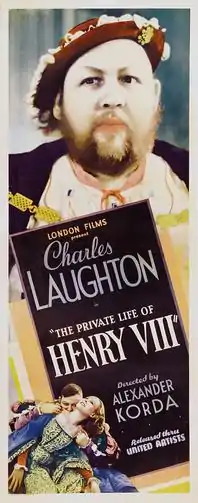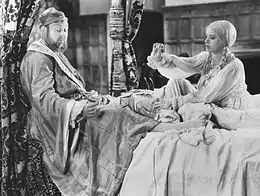The Private Life of Henry VIII
The Private Life of Henry VIII is a 1933 British film which was directed and co-produced by Alexander Korda and starring Charles Laughton, Robert Donat, Merle Oberon and Elsa Lanchester. The film focuses on the marriages of King Henry VIII of England. It was written by Lajos Bíró and Arthur Wimperis for London Film Productions, Korda's production company. The film was a major international success, establishing Korda as a leading filmmaker and Laughton as a box office star.
| The Private Life of Henry VIII | |
|---|---|
 | |
| Directed by | Alexander Korda |
| Produced by | Alexander Korda Ludvico Toeplitz |
| Written by | Lajos Bíró Arthur Wimperis |
| Starring | Charles Laughton Binnie Barnes Robert Donat |
| Music by | Kurt Schröder |
| Cinematography | Georges Périnal |
| Edited by | Stephen Harrison |
Production company | |
| Distributed by | United Artists |
Release date | 17 August 1933 |
Running time | 97 minutes |
| Country | United Kingdom |
| Language | English |
| Budget | £65,000[1] |
| Box office | £750,000[1] |
Plot

The film begins 20 years into King Henry's reign. In May 1536, in the immediate aftermath of the execution of his second wife, Anne Boleyn (Merle Oberon), King Henry VIII (Charles Laughton) marries Jane Seymour (Wendy Barrie), who dies in childbirth eighteen months later. He then weds a German princess, Anne of Cleves (played by Laughton's real-life wife Elsa Lanchester). This marriage ends in divorce when Anne deliberately makes herself unattractive so she can be free to marry her sweetheart. (In an imaginative and high-spirited scene, Anne "wins her freedom" from Henry in a game of cards on their wedding night.) After this divorce, Henry marries the beautiful and ambitious Lady Katherine Howard (Binnie Barnes). She has rejected love all her life in favour of ambition, but after her marriage, she finally falls in love with Henry's handsome courtier Thomas Culpeper (Robert Donat) who has attempted to woo her in the past. Their liaison is discovered by Henry's court and the two are executed. The weak and aging Henry consoles himself with a final marriage to Catherine Parr (Everley Gregg) who proves domineering. In the final scene, while Parr is no longer in the room, the king breaks the fourth wall, saying "Six wives, and the best of them's the worst."
Cast
- Charles Laughton as Henry VIII
- Merle Oberon as Anne Boleyn
- Wendy Barrie as Jane Seymour
- Elsa Lanchester as Anne of Cleves
- Binnie Barnes as Catherine Howard
- Everley Gregg as Catherine Parr
- Robert Donat as Thomas Culpeper
- Franklin Dyall as Thomas Cromwell
- Miles Mander as Wriothesley
- Laurence Hanray as Archbishop Thomas Cranmer
- William Austin as The Duke of Cleves
- John Loder as Thomas Peynell
- Lady Tree as The King's Nurse
- John Turnbull as Hans Holbein
- Frederick Culley as Duke of Norfolk
- William Heughan as Kingston
- Judy Kelly as Lady Rochford
- Hay Petrie as The King's Barber
- Wally Patch as Butcher
- Arthur Howard as Kitchen Helper
- Annie Esmond as Cook's Wife
- Claud Allister as Cornell
- Gibb McLaughlin as The French Executioner
- Sam Livesey as The English Executioner
Production
Alexander Korda was looking for a film project suitable for Charles Laughton and his wife, Elsa Lanchester. Several stories of the film's genesis exist: the resemblance between a statue of Henry VIII and Laughton, a cabby singing the music hall song "I'm Henery the Eighth, I Am", and a discussion on a set of one of his previous films. Originally, the story was to focus solely on the marriage of King Henry VIII and his fourth wife Anne of Cleves, but as the project grew, the story was re-modified to focus on five of Henry's six wives. Only the first wife, Catherine of Aragon, was omitted because those involved had no particular interest, describing her as a "respectable lady" in the film's first intertitles.
Reception
Box office
The film was a commercial success. It made Alexander Korda a premier figure in the film industry at the time; United Artists signed Korda for 16 films. It also advanced the careers of Charles Laughton, Robert Donat, and Merle Oberon. It was also Oberon's first major film role. Laughton would later reprise the same role in 1953 in the film Young Bess, opposite Jean Simmons as his daughter, Elizabeth.
It was the 12th most successful film at the US box office in 1933.[2] The film premiered to record-breaking crowds at New York's Radio City Music Hall and London's Leicester Square Theatre (now the Odeon West End), running for nine weeks at the latter venue from 27 October 1933.[3] It earned rentals of £500,000 on its first release. The film was one of United Artists' most popular films of the year.[4]
Awards
This film was the first non-Hollywood film to win an Academy Award, as Charles Laughton won the 1933 Academy Award for Best Actor for his performance. The film was the first British production to be nominated for the Academy Award for Best Picture.
Laughton was voted Best Actor in a British film by readers of Film Weekly.[5]
Legacy
The Private Life of Henry VIII is credited with creating the popular image of Henry VIII as a fat, lecherous glutton, constantly eating turkey legs and tossing the bones over his shoulder (although in the film, Henry actually eats an entire chicken).[6][7][8][9][10]
Historian Alison Weir has pointed out that this image is contradicted by primary sources, noting "As a rule, Henry did not dine in the great halls of his palaces, and his table manners were highly refined, as was the code of etiquette followed at his court. He was in fact a most fastidious man, and – for his time – unusually obsessed with hygiene. As for his pursuit of the ladies, there is plenty of evidence, but most of it fragmentary, for Henry was also far more discreet and prudish than we have been led to believe. These are just superficial examples of how the truth about historical figures can become distorted."[11]
Copyright status
Due to overlapping changes in British copyright law, the film never fell into the public domain in the UK, and is now due to expire at the end of 2026, 70 years after Alexander Korda's death. In countries that observe a 50-year term (e.g. Canada, Australia, etc.), it expired at the end of 2006.
In the United States the film's original 1933 copyright registration[12] was not renewed after the initial 28-year term, and thus it fell into the public domain there. As a non-US film still in copyright in its country of origin, its US copyright was automatically restored in 1996, with a term of 95 years from release, that will therefore expire at the end of 2028.
Bibliography
- Law, Jonathan (1997). Cassell Companion to Cinema. London: Market House Books Limited. ISBN 0-304-34938-0.
- Magill, Frank (1980). Magill's Survey of Cinema. Englewood Cliffs, New Jersey: Salem Press, Inc. ISBN 0-89356-225-4.
- Korda, Michael (1980). Charmed Lives: The Fabulous World of the Korda Brothers. London: Allen Lane. ISBN 0-7139-1318-5.
See also
References
- "British Film Losses". The Barrier Miner. Broken Hill, New South Wales. 8 February 1936. p. 3. Retrieved 4 August 2012 – via National Library of Australia.
- "Box Office Successes of 1933". The West Australian. Perth. 13 April 1934. p. 3. Retrieved 9 July 2012 – via National Library of Australia.
- Popular Filmgoing in 1930s Britain: A Choice of Pleasures, Exeter: University of Exeter Press, 2000, pp. 77–78
- D. W. (25 November 1934). "TAKING A LOOK AT THE RECORD". New York Times. ProQuest 101193306.
- "Best Film Performance Last Year". The Examiner. Launceston, Tasmania: National Library of Australia. 9 July 1937. p. 8. Retrieved 4 March 2013.
- "Painting of Henry VIII Holding a Turkey Leg – Debunking Mandela Effects". www.debunkingmandelaeffects.com.
- "The Private Life of Henry VIII". 30 August 2010.
- Body in Medical Culture, The. SUNY Press. ISBN 9781438425962 – via Google Books.
- Richards, Jeffrey (10 February 1984). The Age of the Dream Palace: Cinema and Society in 1930s Britain. I.B. Tauris. ISBN 9781848851221 – via Google Books.
- "The Private Life of Henry VIII". History Today.
- Weir, Alison (18 April 2011). Henry VIII: King and Court. Random House. ISBN 9781446449233 – via Google Books.
- US Copyright Catalogue of Copyright Entries, 1933, Volume 6, No. 8, page 361 – 3 November 1933, #7757.
External links
| Wikimedia Commons has media related to The Private Life of Henry VIII. |
- The Private Life of Henry VIII at IMDb
- The Private Life of Henry VIII at the BFI's Screenonline
- The Private Life of Henry VIII at AllMovie
- The Private Life of Henry VIII at the TCM Movie Database
- The Private Life of Henry VIII at the American Film Institute Catalog
- The Private Life of Henry VIII at Rotten Tomatoes
- The Private Life of Henry VIII review at Old Movies